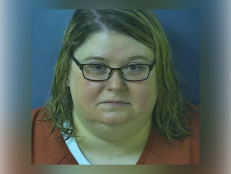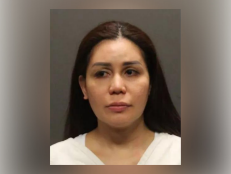The Long Criminal History Of The 'Death House Landlady'
Gray-haired landlady, Dorothea Puente, made headlines as one of the most shocking serial killers in Sacramento history.
![Dorothea Puente [Sacramento Police Department]](http://investigationdiscovery.sndimg.com/content/dam/images/investigationdiscovery/crimefeed/legacy/2017/11/Dorothea-Puente-11102017.jpg.rend.hgtvcom.616.462.suffix/1541780546020.jpeg)
Dorothea Puente [Sacramento Police Department]
SACRAMENTO, CA — On November 11, 1988, detectives swarmed a Victorian-style home on F Street in Sacramento where guests had a habit of checking in — and then never checking out.
Investigators were initially searching for Alberto Montoya, a man with schizophrenia whose social worker had reported him missing. After noticing disturbed soil, they instead uncovered the body of 78-year-old Leona Carpenter, another tenant of the house. Eventually, they would find six more corpses on the property.
The culprit was none other than the gray-haired landlady, Dorothea Puente, who would make headlines as one of the most shocking serial killers in Sacramento history.
How Puente Became The 'Death House Landlady'
Puente, whom the media nicknamed the "Death House Landlady," would murder her elderly boarders and tenants with disabilities by poisoning them before getting rid of their remains and cashing their Social Security checks.
Puente, who was born Dorothea Helen Gray, had a long criminal history prior to the murders that included arrests for forging checks, and owning and managing a brothel. She later found work as a nurse's aide caring for people with disabilities and elderly people in private homes, and from that moved to managing boarding houses.
In 1966, she married Roberto Puente, a man 19 years her junior, in Mexico City — but the marriage only lasted two years. After her marriage failed, Puente took over a three-story, 16-bedroom care home at 2100 F Street in Sacramento. She later began renting out an upstairs apartment in a home at 1426 F Street.
In 1976, she married for a fourth time to Pedro Montalvo — but once again, the marriage didn't last, and fell apart in just a few months.
Who Were Her Victims?
In April 1982, 61-year-old friend and business partner Ruth Monroe began living with Puente in her upstairs apartment, but soon died — apparently from an overdose of codeine and acetaminophen. Puente told police that her tenant had been depressed, and Monroe's death was ruled a suicide.
A few weeks later, the police were back after Malcolm McKenzie, 74, accused Puente of drugging and stealing from him.
She was convicted of three charges of theft on August 18, 1982, and sentenced to five years in jail, from where she began corresponding with a 77-year-old retiree named Everson Gillmouth.
When Puente was released in 1985 after serving only three years of her sentence, Gillmouth was waiting for her. The couple moved into the upstairs apartment at 1426 F Street.
When Her Crimes Began To Quickly Unravel
In November 1985, Puente hired a handyman, and asked him to build a 6' by 3' by 2' box, which she said was for storage — but later dumped on a river bank.
On January 1, 1986, a fisherman spotted the box and reported it to authorities. Inside, investigators found a badly decomposed and unidentifiable body of an elderly man. The remains inside belonged to Everson Gillmouth — though they would not be identified for another three years.
During this time, Puente continued to take in regular tenants and was popular with local social workers because she agreed to accept people with addiction and abusive residents.
Neighbors became suspicious when they noticed that a man known only as "Chief," who worked as Puente's personal handyman, was performing unusual tasks that included digging in the basement and carting soil. Soon afterward, he disappeared.
![Dorothea Puente in 2009 [Central California Women's Facility]](http://investigationdiscovery.sndimg.com/content/dam/images/investigationdiscovery/crimefeed/legacy/2017/11/Dorothea-Puente-a-11102017.jpg.rend.hgtvcom.616.770.suffix/1541781212201.jpeg)
Dorothea Puente in 2009 [Central California Women's Facility]
Her Trial and Death
Shockingly, once her crimes had come to light and investigators had discovered the mass grave in her home, the crafty Puente still gave detectives the slip one final time. Investigators allowed her to leave the property to buy a cup of coffee. Instead, she immediately escaped to Los Angeles, where she befriended an elderly pensioner she met in a bar. But her new friend recognized her from police reports on television, and called police.
Puente's trial began in 1992, and she was charged with a total of nine murders, convicted of three, and sentenced to two life sentences without the possibility of parole. She died on March 27, 2011, in prison in Chowchilla at the age of 82 from natural causes.
Until the end of her life, she maintained her innocence and continued to insist that all of her tenants also died of "natural causes."
John Cabrera, one of the original detectives in the Puente case, recently returned to the F Street "house of horrors" in order to lead law-enforcement professionals through an advanced homicide class. “She had the perfect crime going on here in this house, and nobody knew about it,” Cabrera told CBS 13. “It was right under the nose of everybody.”
To learn more about Dorothea Puente, stream the "House of Horrors" episode of A Stranger In My Home on discovery+ now.









